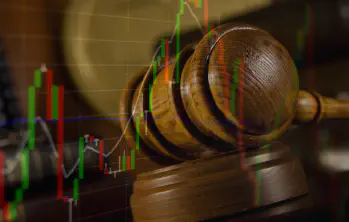E*TRADE fined $350k for market abuse surveillance failures
E*TRADE has been fined by FINRA for failures in market abuse supervision
Last Tuesday, it was announced that the trading platform E*TRADE - a subsidiary of Morgan Stanley - would be fined $350,000 by the Financial Industry Regulatory Authority (FINRA).
This fine, as well as a censure order, was issued by FINRA owing to E*TRADE’s failure to maintain adequate trade surveillance systems to ensure compliance with market abuse regulations.
FINRA stated that “From February 2016 through November 2021, E*TRADE failed to establish and maintain a supervisory system […] related to detecting potentially manipulative trading by its customers.”
In particular, the regulator accused the trading platform of altering the parameters for a number of their algos, specifically, marking-the-close. They also claimed that the supervisory system enacted by E*TRADE was insufficient and did not adequately ensure compliance with the relevant market abuse regulations.
This fine follows a $900,000 fine issued by FINRA to E*TRADE for inadequate best execution supervision in 2016. The firm has agreed to pay the fine without contest.
Inadequate Supervision
The most striking aspect of this fine is the fact that E*TRADE did have trade surveillance processes in place.
In theconsent letter outlining E*TRADE’s infringements, FINRA acknowledged that the firm had trade surveillance processes in place, but emphasised that these processes were insufficient and did not ensure compliance.
The regulator questioned the efficacy of a trade surveillance process incapable of flagging suspicious activity and detecting potentially manipulative trading on the part of its customers.
Compliance is no longer an issue of what solutions a firm has in place, but how effective these solutions are.
To this end, FINRA stated that “E*TRADE failed to maintain a supervisory system that was reasonably designed to achieve compliance with applicable federal securities laws and regulations.”
While many financial firms still seem to believe that implementing any trade surveillance solution will be enough to tick a box and avoid fines from regulators, FINRA’s approach here clearly disproves this.
Douglas Moffat, eflow’s Business Development Director, echoed this point with this point. “As a result of their system’s one-dimensional parameters producing numerous false positives, they decided to loosen the thresholds in order to reduce the number of alerts,” he claimed. “This allowed infringing trades to slip through the cracks.”
A number of software vendors are guilty of this oversight. These types of fines are the direct result of overly static parameters, and E*TRADE are by no means the only firm to fall short on this front.
Increasingly, we expect regulators to push harder on this front. Compliance is no longer an issue of what solutions a firm has in place, but how effective these solutions are.
The Need for Active Monitoring
Because of this, firms should be especially cautious when choosing a trade surveillance solution.
While a good feature set, extensive options for dynamic parameter calibration and a variety of tests and reporting options are all vital for a good trade surveillance solution, firms looking to get compliant should ensure that their vendor provides active monitoring.
The concept of active monitoring involves the vendor actively supervising, analysing and reporting back to the client on how they are interacting with their surveillance system. This ensures that any lapses in compliance are caught early and can be rectified before fines are issued by regulators.
All of eflow’s solutions, including TZ for Trade Surveillance, include active monitoring as standard. For more information on this, fill out a contact form or read more here.



